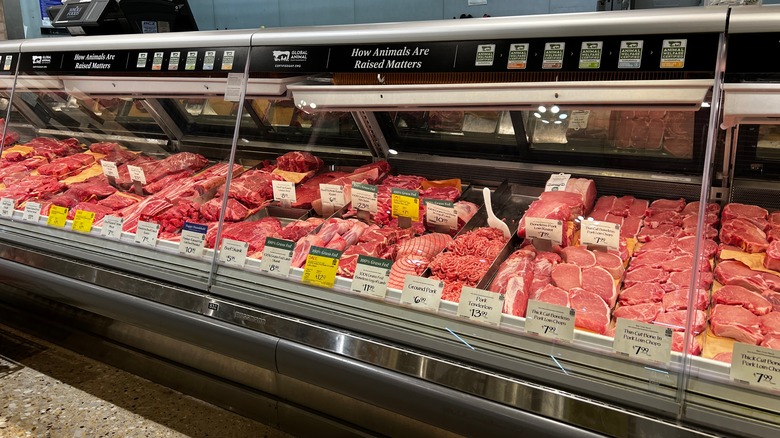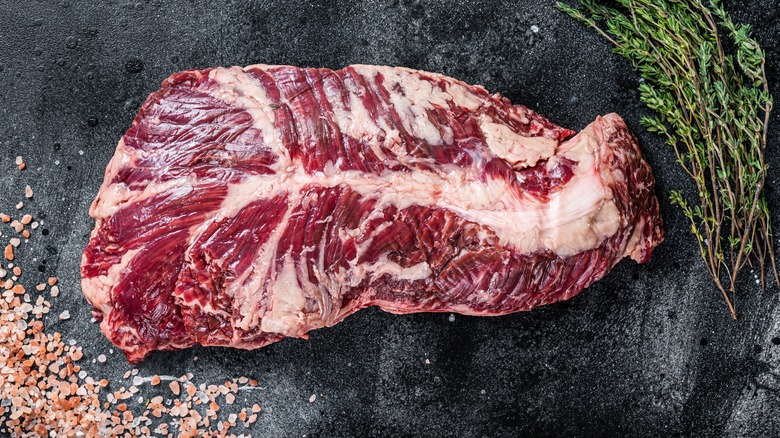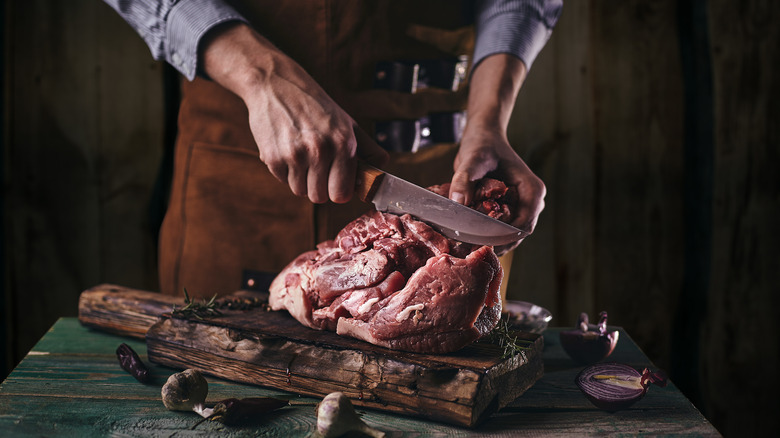Whole Foods Is The Go-To Grocery Chain For Professional Butchers. Here's Why
Whole Foods has earned a reputation for selling high-quality food. Shoppers flock to the grocery chain's many locations for a vast variety of products: Some covet Whole Foods' array of unique condiments, while others are hungry for its wide range of cheeses. Certain shoppers don't even care about the comestibles — they're just there for the dazzling flower arrangements, offbeat cosmetics, and eco-friendly cleaning supplies. No matter what you're looking to spend your hard-earned dollars on, you can be confident that if you're getting it from Whole Foods, it's probably going to be good. The savviest shoppers even know the best days of the week to visit the celebrated chain.
Plenty of home cooks looking to kick their dinner up a notch with high-quality ingredients know about Whole Foods' virtues. But the store's impressive reputation doesn't just reel in everyday foodies — it attracts experts as well. In fact, Whole Foods is the go-to grocery chain for professional butchers with years of experience.
Whole Foods butchers know what they're talking about
For Food & Wine, professional butcher Walter Apfelbaum offered his opinions on what it takes to create the perfect burger blend for every possible occasion. Apfelbaum is no rookie: He has 30 years of experience in the world of meat, and his Instagram account is like a glimpse of what awaits good carnivores in heaven. This is a man who knows the virtues of gorgeously marbled Wagyu beef, what dry aging can do for a prime ribeye, and how to properly plate a perfectly prepared porterhouse steak.
In short, when a seasoned pro like Apfelbaum tells you how to properly shop for, prepare, and consume beef, you should listen. According to him, there's no better place to shop for meat than Whole Foods. What makes the grocery chain stand out against its competitors? It's simple: expertise. Larger grocery stores handle gargantuan quantities of meat, forcing them to put profit ahead of quality. "If you just walk into a grocery store" Apfelbaum remarked, "some kid behind the counter is going to listen to his boss who's like, 'This is on sale because we've got to sell it.'" In contrast, Whole Foods cares about the art of butchery and the specific qualities of the meat they sell. "I know that I can go to a counter at Whole Foods," Apfelbaum notes, "and I know I can talk to a butcher, or guys who are learning to be butchers." This makes all the difference.
The importance of good meat
Walter Apfelbaum isn't the only carnivore who holds the Whole Foods butcher counter in high esteem. Commenting on a thread celebrating Whole Foods' quality meat, one Reddit user opined, "I used to cut for them and it's honestly one of the best places for finding really marbled steaks for a decent price." Other Redditors also chimed in, mentioning the premium T-bone, ribeye, and strip steaks they'd purchased from the celebrated grocery chain.
You might not be as passionate a beef aficionado as the sort of people who frequent an online space entirely devoted to steak, but if you eat meat, you should pay attention to where you get it from. Learning how to properly shop for meat can be complex: The savvy consumer must pay attention to cut, USDA label, fat content, and nitty-gritty details like silver skin, grain, and collagen. But acquiring such knowledge and putting it into practice is well worth it. If you live near a Whole Foods location, you're halfway to the finish line already: Just head for the butcher counter and ask the experts working there — who must first undertake an intensive, year-long Whole Foods apprentice program – for help. You'll be sure to leave with a quality piece of meat and maybe even some exciting plans for cooking it.


